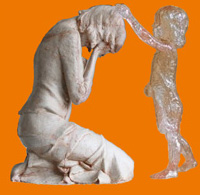I have two things to say about this movie:
One, it is a shame that having cooked up this whole complicated sci-fi world, the main thing Johnson does with it is have men run around shooting each other.
Two, to me the most interesting thing about this movie is its stance toward old Joe and his wife. Midway through the movie there's a scene in which young Joe tells his older self that the solution to their problem is for old Joe to show him a picture of his wife, so that when young Joe becomes middle-aged Joe, he can avoid that woman if he ever runs into her. He doesn't know her from any of the other billions of women on the planet and is perfectly happy to marry someone else, which would result in an old Joe with a different set of memories and a longer life for the woman in the picture. Old Joe's response is to punch his younger self in the face. As far as he's concerned, meeting his wife is the thing that redeemed his previously shitty life, and giving her up is not an option. I'm used to stories like these treating it as imperative to protect beloved people and relationships in the status quo timeline, so it was interesting to see this movie take young Joe's side. I once read a Livejournal post in which the author discussed a dream he'd had in which he'd gone back in time to his teenage years, with a chance to do things differently. That's the sort of thing I spend around 90% of my waking life daydreaming about, but he described being devastated to realize that, no matter what happened, he would never have the son that he had in the original timeline, i.e., real life. Looper's response would be to point out that given the astronomical number of possible children you could have had even with your current partner, let alone with the other partners you could have had, there's no reason to think that you happened to end up with the kid with whom you would have forged the strongest bond. Statistically speaking, you probably did about average. So, yes, you'd lose something by giving up the current timeline — but you have to weigh that against what you're losing by giving up other possible timelines, ones that you have every reason to think might be better overall, since you'd be working with the benefit of a practice run.
Obviously, it's easy for me to be cavalier about giving up the relationships I've forged in this timeline because at the moment I'm not particularly close to anyone, and those few people I've been close to in the past have had ample reason to wish for a timeline in which I'd been armed with their photographs so I could avoid them and spare them some grief. But you don't have to find yourself in The Darkest Timeline to see the error in privileging the timeline we're in just because we're in it. The next episode of Radio K touches on this, and I was actually going to wait to post this writeup until I could link to it, but I don't know when it will be ready and I decided that I really ought to get back to working through my movie queue in the meantime. (Some might suggest that I skip ahead to the next movie and come back to this one later, but that would be madness. ORDER MUST BE MAINTAINED.) So here's a sneak preview of what Clare Parker has to say on this topic:
Actually, the idea of mourning for someone whose grandparents never met is the theme of Astro City v2 #½, which is larded with retro superhero universe silliness but which is nevertheless the thing in the world that most reliably makes me cry. And while in my case the word "mourning" might be too strong, I do often find myself melancholy about people who never existed. One refrain I've heard from several people when my relationships have fallen apart is "at least you didn't have kids" — both for the kids' own sake, and because "they'd be in another state or country and that would make you miserable". But I dunno about that second part. I have never been in a relationship in which my partner and I didn't pick out names for our potential future children, which may not be an advisable practice since it makes them feel real. And instead of being in another state or country, they're now trapped in other timelines. That doesn't strike me as better.
 Looper
Looper




